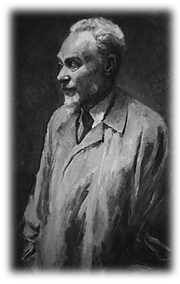![]()
Departments
Arts
![]()

|
Week of 17 April 1998 |
Vol. I, No. 28 |
Arts
Primo Levi
Italian writer who emerged from the inferno of Auschwitz subject of BU conference
By Michael B. Shavelson
In his 1947 memoir, Survival in Auschwitz, Italian author Primo Levi describes an episode in which he and a group of fellow prisoners are sent to scrape the sludge out of a dark underground fuel tank. Something prompts Levi to begin describing Dante's Inferno aloud and to recite part of the poem to his workmates. The experience was one of the triumphs of humanity over the bestiality of the Nazis
For Levi's readers, the reference to Dante has a double resonance. Levi went down to hell and lived to tell about it -- and in the telling he produced some of the most evocative literature in Italian.
Primo Levi: Witnessing, Memory, and Writing, scheduled for April 25 through 27 at BU, will give both scholars and the public a look at several unexplored aspects of Levi's work, according to Nancy Harrowitz, conference coordinator and CAS associate professor of Italian. "Levi is one of the most important voices to come out of the Holocaust," she says. "He is a complex and fascinating writer, and I've invited to the conference scholars who are looking at aspects of his work that had not been considered before, such as Levi and film."
The conference features the Boston premiere of Francesco Rosi's film The Truce, on Sunday, April 26, at the Coolidge Corner Theatre in Brookline. The movie is based on Levi's The Reawakening, which treats Levi's long and fantastic journey home after his release from Auschwitz. The movie will be one of the topics of a roundtable discussion on Levi and film to be chaired by T. Jefferson Kline, French professor at CAS and an expert on cinema.
Another area to be explored is Levi's poetry. "The fact is that although he has a legion of readers -- he's been translated into 17 languages at the very least -- not only have most people not read his poetry, they don't know that he wrote poetry," says the Cambridge poet and Levi translator Ruth Feldman, who will speak at the conference. "It's very different from the prose," she says. "He allowed himself to do some things in the poetry that he never permits himself to do in his very controlled and disciplined prose. He lets his rage and despair erupt."
That control is one of the hallmarks of Levi's autobiographic and fictional writing about the Holocaust. "He never rubs your nose in physical horror," says Feldman. "The thing that really gets you is the destruction of the human spirit that the Germans wanted to achieve while they destroyed people physically. That was really Levi's chief concern."
|
|
|
Primo inter
pares |
While in Auschwitz, Levi underwent "a brutal confirmation of my condition as a Jew" -- and realized that if he survived, he would have to tell his story. The experience, he told an interviewer, "was what turned me into a writer." In 1947 he published If This Is a Man (later translated as Survival in Auschwitz), one of the first testimonies about life in a concentration camp. He continued to write about the Holocaust until his death -- an apparent suicide -- in 1987.
But Levi is not exclusively a Holocaust writer, Harrowitz stresses, and many American readers know him for his science fiction collection, The Sixth Day and Other Tales. "Those stories reveal him not just as a superb science fiction writer, but also as someone with a wonderful sense of humor," she says.
Authors' reputations frequently undergo reevaluation -- for better or worse. In Levi's case it has been strongly the former. "Levi had been marginalized to some degree as a Jewish writer and as a writer about the Holocaust," says Harrowitz, "but that has really changed over the last three or four years. Now he is considered one of Italy's foremost contemporary writers."
Primo Levi: Witnessing, Memory, and Writing will be held from Saturday, April 25, through Monday, April 27. All nonfilm sessions take place at the GSU Conference Auditorium. Registration is free, and the event is open to the public. For more information, call Nancy Harrowitz at 353-6207. To register, call 353-2642. The Truce will be shown at the Coolidge Corner Theatre at 4:30 p.m. on Sunday, April 26.
